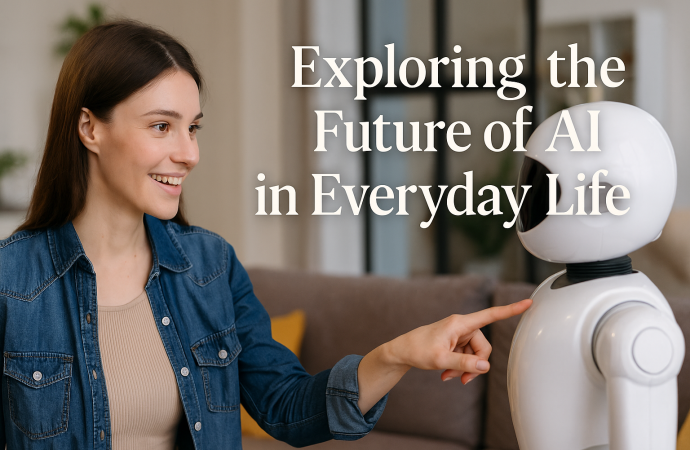Introduction Artificial intelligence is no longer confined to labs or sci‑fi films. Today, we see AI in everyday life through AI assistants, smart home AI, and helpful apps. As we move into 2025 and beyond, the future of AI promises even more changes. From how we cook dinner to how doctors diagnose illness, AI tools
Introduction
Artificial intelligence is no longer confined to labs or sci‑fi films. Today, we see AI in everyday life through AI assistants, smart home AI, and helpful apps. As we move into 2025 and beyond, the future of AI promises even more changes. From how we cook dinner to how doctors diagnose illness, AI tools will make our lives easier, safer, and more fun. In this article, we explore what AI is, how it works at home and at work, its role in health and education, and why AI Ethics Matter. You’ll also get simple tips on using AI safely every day. Let’s dive into the world of everyday AI.
What Is Artificial Intelligence?
Artificial intelligence means teaching machines to think or learn like humans. Instead of just following fixed rules, AI systems can spot patterns in data and make decisions. For example, an app that suggests songs based on what you like uses AI. A self‑driving car that recognizes stop signs also uses AI. In simple terms, AI combines data, computer power, and smart algorithms to perform tasks once done by people.
Narrow AI handles one job, like speech recognition or spam filtering. General AI, still in research, aims to match human problem‑solving across many tasks. Right now, narrow AI is what powers most smart home AI and AI assistants we use daily.
How AI Transforms Our Homes
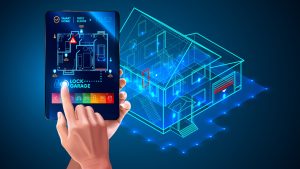
Image by: Yandex.com
Smart Home AI
Imagine lights that turn on when you step into a room or thermostats that learn your comfort settings. That’s smart home AI at work. These systems connect to your Wi‑Fi and learn patterns. Over time, they predict what you need and act without a button press. A smart fridge can track groceries and suggest recipes. A robot vacuum maps your living room and cleans at scheduled times.
These AI devices save energy and time. You might lower your heating when you leave, or get an alert if a door was left open. As more gadgets link to your home network, they work together—for example, your security camera can tell your lights to turn on when it spots motion at night.
One of the most noticeable ways AI is impacting everyday life is through its integration into smart homes. AI is transforming how we manage our homes, making daily tasks easier and more efficient. Here’s how:
Smart Assistants
Virtual assistants like Amazon’s Alexa, Google Assistant, and Apple’s Siri are powered by AI and are now part of many people’s daily routines. These voice-activated assistants can control smart devices, set reminders, answer questions, and even help with shopping. In 2025, expect these assistants to become even smarter, offering more personalized experiences and deeper integration with your home’s systems.
Smart Appliances
From refrigerators that can track your grocery list to washing machines that adjust settings based on the type of fabric, AI is making appliances smarter. These devices learn your preferences and habits, allowing them to run more efficiently. For example, an AI-powered fridge might notify you when you’re running low on essential items or suggest recipes based on the ingredients you have.
Energy Efficiency
AI is also helping homeowners save energy. Smart thermostats like Nest can learn your schedule and adjust the temperature accordingly, helping to reduce energy consumption and lower utility bills. In the future, AI could optimize energy use throughout the entire home, even adjusting lighting and appliance settings for maximum efficiency.
AI at Work and in Daily Tasks

Image by: Yandex.com
AI Assistants
AI assistants like Siri, Alexa, or Google Assistant live in our phones and speakers. You can ask them to set reminders, play music, or check the weather. In workplaces, AI assistants help schedule meetings, draft emails, and summarize reports. They free up time for creative tasks, letting people focus on bigger goals.
Smart Scheduling
Businesses use AI to set shifts, track tasks, and even forecast sales. This helps managers plan better. For gig workers, AI apps match available jobs to skills and location, making it easier to find work when you want it.
Automation of Repetitive Tasks
Tools like chatbots and AI-powered scheduling assistants can handle simple queries and arrange appointments, freeing up valuable time for more meaningful work.
Data Analysis and Insights
In industries like marketing, finance, and healthcare, AI is being used to analyze vast amounts of data to uncover insights and trends. This helps businesses make better decisions, predict future trends, and personalize services for customers. For example, AI-powered tools can analyze consumer behavior and suggest personalized products or services.
Personalized Learning and Training
In the workplace, AI is being used to personalize training programs for employees. Based on their strengths, weaknesses, and learning styles, AI can tailor educational content to help employees learn more effectively and at their own pace. This makes it easier for employees to improve their skills and adapt to new roles or technologies.
AI in Healthcare

Image by: Yandex.com
Faster Diagnosis
In hospitals, AI can review medical scans like X‑rays or MRIs and spot issues early. This helps doctors diagnose diseases faster. AI tools also sift through patient records to suggest personalized treatment plans. The result is quicker care and better outcomes.
Virtual Health Helpers
Apps with AI chatbots can answer health questions and remind you to take medicine. They track symptoms and alert you or your doctor if something seems wrong. This kind of AI in healthcare makes it easier to manage chronic conditions like diabetes or high blood pressure from home.
Personalized Treatment Plans
In 2025, AI is being used to create personalized treatment plans for patients. By analyzing a patient’s medical history, genetic information, and lifestyle data, AI can recommend the most effective treatments or medications. This can help reduce trial and error in treatment and lead to better patient outcomes.
Telemedicine and Remote Monitoring
With the rise of telemedicine, AI is also being used to monitor patients remotely. Wearable devices and health apps powered by AI can track vital signs, alert doctors to potential issues, and even provide real-time advice to patients. This is especially important for managing chronic conditions or monitoring elderly patients from the comfort of their homes.
AI in Education
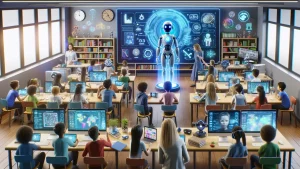
Image by: Yandex.com
Personalized Learning
Every student learns at their own pace. AI in education tools adapt lessons to fit each learner. If someone struggles with math, the app offers extra practice. If they master a topic, it moves them forward. This keeps students engaged and builds confidence.
Smart Tutoring
They can explain concepts, quiz learners, or provide feedback on writing. Schools use these tools to support teachers and give students extra help outside class hours.
AI in Entertainment: The Future of Personalization
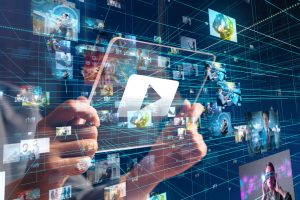
Image by: Yandex.com
In entertainment, AI is transforming how we consume media. Whether you’re watching a movie, playing a game, or listening to music, AI is helping to make these experiences more personalized and enjoyable.
1. Personalized Recommendations
Streaming platforms like Netflix and Spotify use AI to recommend movies, TV shows, and music based on your preferences. As AI continues to evolve, these recommendations will become even more accurate, learning not only from your past choices but also from your mood, the time of day, and what’s trending in your social circle.
2. Interactive Gaming
In the world of gaming, AI is being used to create more immersive and responsive gaming experiences. Future games may use AI to generate unique levels, quests, and storylines based on individual player behavior.
3. Content Creation
AI is also making waves in content creation. Tools powered by AI are helping musicians compose music, artists create digital art, and writers generate stories.
The Importance of AI Ethics and Safety
As AI grows in our lives, we must use it responsibly. Here are key points:
Fairness: AI systems learn from data. For example, a hiring tool must be trained on diverse resumes to avoid bias.
Transparency: People should know when a decision comes from AI. If an AI tool denies a loan or suggests a job candidate, it’s fair to explain why.
Safety: AI must keep our data private and secure. We should use strong passwords, two‑factor authentication, and updated software to guard against hacks.
How to Embrace Everyday AI Safely
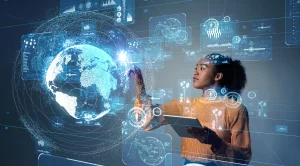
Image by: Yandex.com
To make the most of AI at home and work, follow these simple tips:
Set clear passwords and use two‑factor authentication on all AI devices.
Check privacy settings on your smart speakers and apps, limiting data sharing where possible.
Use reputable brands and read reviews before buying AI gadgets.
Keep your devices updated with the latest software patches.
Teach family members basic AI safety rules to avoid scams and data leaks.
These steps help you use everyday AI with confidence.
Table: AI Applications in Everyday Life
| Area | AI Example | Key Benefit |
|---|---|---|
| Smart Home | AI thermostat | Saves energy, adds comfort |
| Virtual Assistance | Voice assistant in phone | Hands‑free help with tasks |
| Healthcare | AI medical scan analysis | Faster, more accurate diagnoses |
| Education | Adaptive learning platform | Personalized lessons for students |
| Work | AI scheduling tools | Better planning and time savings |
Conclusion
The future of AI in everyday life is bright and exciting. From smart home AI that makes chores simple to AI in Healthcare that saves lives, artificial intelligence is already all around us. In schools, AI helps students learn at their own pace. At work, AI assistants free us from routine tasks. By following AI ethics and AI safety tips, we can use these tools smartly and securely. As you explore AI gadgets and apps, you’ll see how they boost comfort, health, and learning in 2025 and beyond.

